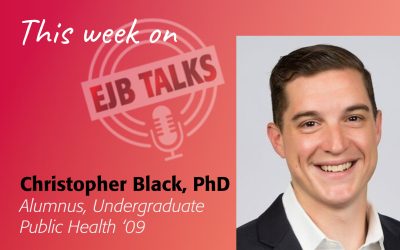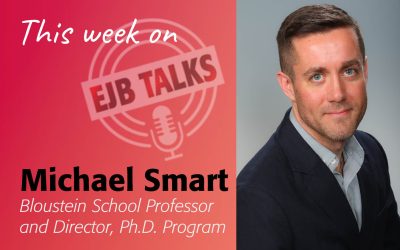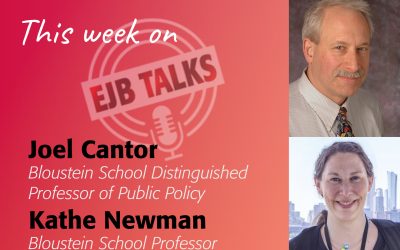Professor Shapiro welcomes Judge Paul Armstrong, Senior Policy Fellow and Judge in Residence at Bloustein, this week on EJB Talks. COVID-19 has raised important ethical issues surrounding patient care and the distribution of vaccines. Stuart talks to Judge Armstrong about being the recipient of the Lighthouse Award from the New Jersey Commission on Professionalism and the Law, which reflects the Judge’s incredible career achievements in ethics and the law. They discuss ethical issues in health care that Judge Armstrong played a part in such as the Quinlan case and Baby M and how these incredibly important landmark cases have now prepared him to serve on New Jersey’s Advisory Committee on COVID-19.
Stuart Shapiro
Welcome to EJB Talks. I’m Stuart Shapiro, the Associate Dean of the Faculty at the Bloustein School, and the purpose of this podcast is to talk with my colleagues and our alumni about policy, planning and health and the interaction between these issues and how they affect people in New Jersey, the United States and the world.
Today, we’re talking to Judge Paul Armstrong, a Bloustein policy fellow who was on the New Jersey Superior Court for more than a decade. He teaches classes for us on the ethical issues surrounding health care. Judge, welcome to the podcast.
Judge Armstrong
Good morning, and thank you so much, it’s a privilege to join you.
Stuart Shapiro
Recently, the New Jersey Commission on professionalism in the law gave you their Lighthouse Award. Can you tell us a little bit about this honor?
Judge Armstrong
I’d be happy to. As you know, this is the 25th anniversary of the New Jersey Commission on Professionalism in the Law. And on this occasion, the Lighthouse Award is meant to represent the best attributes of the legal profession. The true privilege of its receipt, I believe, belongs to the clients that I have been privileged to represent and to the sisters and brothers of the bench with whom I have been privileged to serve as a superior court judge for nearly 18 years.
I know that you would recall the family of Karen Ann Quinlan and the New Jersey Supreme Court’s internationally known landmark decision. Other privileges included chairing the New Jersey Bioethics Commission, which is responsible for drafting our living wills or advanced directive statute, and the declaration of death and a comprehensive report on our supreme court’s landmark decision of Baby M. It’s also the privilege of chairing a very good friend of Bloustein, Governor James Florio’s Advisory Council on AIDS. This was the courageous first of its kind in the nation to address this particular pandemic. And it became a model for the rest of the nation.
There’s also the privilege of representing as amicus curiae, the American Hospital Association and the Medical Society of New Jersey, before the United States Supreme Court in two separate landmark health care decisions. I believe that the privilege of representing these clients with their wisdom and courage remain the true recipients of this prestigious Lighthouse Award from our Bar Association.
Stuart Shapiro
Congratulations in any case… and the issues you talk about, and it’s a fascinating interplay between health between policy, law, ethics, there are so many directions we could go on. Of course, we’re in the middle of a pandemic now. So I’m going to start with that. You’ve served on the advisory committee on COVID-19. Can you talk a little bit about this experience and what that group has worked on?
Judge Armstrong
I’d be happy to. But at the outset, I must genuflect in words to Governor Phil Murphy and Commissioner Judith Persichilli and their teams for the extraordinary and tireless leadership on behalf of 9 million New Jersey citizens during the challenging course of this deadly pandemic. So too, the many members of the Rutgers community who also serve on this Department of Health Advisory Commission, and freely share the experiences and wisdom in countering COVID-19.
As you probably know, in January 2020, the state of New Jersey started actively tracking the outbreak of a novel coronavirus, since the COVID-19 public health emergency was declared by Governor Phil Murphy through his executive order 103 on the 9th of March 2020. As a result, New Jersey mobilized the statewide–more importantly, a data-driven COVID-19–response that includes health care capacity expansion, focus on vulnerable populations that I know you have a deep concern and that, the scaling of testing contactors tracing and exposure notification mobilization, resource provision, and resiliency planning. And importantly, the state informs COVID-19 efforts through transparent information to the public and through funding and technical guidance. All you have to do is turn on New Jersey 12 and you’ll see the Governor and our Health Commissioner at noon every day. Although ironically, our health commissioner, as you know, is actually in quarantine now, as one of her staff members tested positive for COVID-19
Stuart Shapiro
And I get those text messages almost several every day on updates and status as well, certainly help in terms of publicizing where we are and a boon for transparency. So, we’re all very excited about the possibility of a vaccine. There have been positive results from Pfizer, Moderna, the somewhat confusing results from AstraZeneca. And that’s clearly going to be a major… the distribution of these vaccines is going to be a major issue in 2021. What principles should be guiding, and what are you going to be thinking about as vaccine distribution decisions are made?
Judge Armstrong
You couldn’t have picked a better day. As you know, the advisory committee that advises the CDC is meeting later today to actually answer in full that question. And what they generally do is they give the information to the CDC. And then each state is able to craft based upon its particular needs. And of course, New Jersey with 9 million people and somewhat ahead of the curve, since we’ve learned so much from the experience in the past… but basically, the COVID-19 professional advisory committee has adopted the overarching ethical principles, which have been adopted by the CDCs Advisory Committee on Immunization Practices. That’s the group that’s meeting later today, for phase prioritization of COVID-19 vaccines.
These serve as a foundation of our PACs, recommendations and include, of course, the ethical principles of maximizing benefits and minimizing harms, equity, of course, justice, and transparency. The strategic aims, as documented in the COVID vaccine plan, which I know you have had a chance to review, are… the recommendations are in… of the PAC are in service to the state of New Jersey, with the following aims; and that is to provide equitable access to COVID-19 vaccine to all who live work, and especially for us, those who are educated here in New Jersey, to achieve community protection, assuming vaccine efficacy.
And I’m glad you brought that up because much of this work was done in the absence of the wonderful work of both Pfizer and Moderna have now applied for national and worldwide okays from the review groups. And to build a suitable trust in the COVID-19 and other vaccines, as you know, all across the country in the world. Now there are has not been a large embracement of the efficacy of the vaccines in large measure that has emanated from Washington. And New Jersey has to overcome some of that skepticism that was generated by the current administration.
Stuart Shapiro
So how do you think this is going to play out? I mean, obviously, vaccines are more effective, the more people get them. And at the same time there is this skepticism and ramping up is going to take time. I mean, mass production of vaccines doesn’t happen overnight. So where are we going to see vaccination rates high at first? Where are the concerns that you see as this plays out?
Judge Armstrong
Well, first of all, I’m overwhelmed by the cooperation and goodwill of New Jersey’s healthcare community. Our leading hospital systems–there are 71 hospitals in New Jersey–the New Jersey Hospital Association, the Medical Society in New Jersey, our Nurses Association, the nursing home group, as well have all come together to help build a strong structure. We’ve learned a lot of lessons from the first surge. As you know, the models are telling us that we are going to be very shortly in mayhaps an even stronger surge. But I still remain optimistic that we will collectively stem the tide of this global pandemic. It won’t be easy as you point out, but with changes in Washington, coupled with our state’s now readiness and the desperately needed cooperation of our citizens we will triumph over this crippling virus.
The question the fundamental questions that you ask about who gets what when first is this afternoon’s debate by the group that will provide it to the CDC. We will be monitoring that today that it’s life, you can actually follow it. The arguments are generally health care workers first, the elderly. And then we get into the secondary groups that deal with a whole host of individuals that are underserved and those who have not received historically health care as well. I’ll be better able to answer that question probably within a week or two, because the good news is that we may receive those vaccines for that first group, probably within three to four weeks.
Stuart Shapiro
That’s great. I know they’re in for FDA approval now, right?
Judge Armstrong
Absolutely, yes. They meet on the 10th of December with regard to it.
Stuart Shapiro
Gotcha. So, you know, as we look forward here, you know, I’m a 50 plus-year-old white male who has the luxury of working remotely, I probably shouldn’t be a high priority for a vaccine, at least at first. But I’m willing to bet that I get it before some people that should be a higher priority. Is that a fair assessment of where things will probably play out in practice?
Judge Armstrong
Well, in the past that has defined us as Americans, I think you’re absolutely right. I remember stories from my dad, as a five and 70-year-old white male, about the depression and Second World War, and how we all pull the laboring oar. There’s another clarion call, now there’s a change in Washington, there’s going to be tapping into that, that sort of deep notion of Americanism, that says we have to pull together. That those that keep us healthy should receive at first those that provide necessary services should get it as well.
Stuart Shapiro
Yeah, and it’s helping certainly, let’s hope that the rhetoric that comes out of Washington, the change that we will see there makes a very real difference in people’s willingness to get vaccinated and understand the importance of doing so. Throughout this pandemic, we’ve seen the inequalities in society laid bare really. Has that been a subject that the advisory committee has talked about and incorporated into its recommendations?
Judge Armstrong
At every meeting since March of 2020 that has been a central focus, you put your finger right on it. We have, well we’ll take a look at the work of Mayor Ras Baraka, for example, He’s been exemplary in trying to tamp down the spread in a community that has been underserved medically, historically, throughout our entire history. So yes.
The interesting thing about this afternoon’s debate is that that’ll be front and center. Should the underserved, those in the past who have not those that have co-occurring disorders, for example. African American and Hispanic communities do have these co-occurring disorders that make them more susceptible to catching COVID-19. And the question is, where do they fit in on the priorities? And that’s a universal question that’s being asked, not only in Washington but every state that is wrestling with this terrible pandemic.
Stuart Shapiro
Yeah, absolutely. I mean, in some ways, it’s good that this has been highlighted, obviously, the cost of doing that has been enormous and not something we would willingly take on. But at least there’s been more attention paid to these issues as a result.
I mentioned in my introduction that you teach healthcare ethics for us. Always a fascinating field. You mentioned some of your history in the area. The past year, what have you, what have you incorporated into your classes from the lessons we’ve learned about the pandemic and through the experience we’ve been through?
Judge Armstrong
Well, again, I would say another one of the privileges of these chairs is to be with you here at Bloustein, with the current and future stewards of our healthcare system. Normally you and I would employ or the entire faculty would employ a sort of textbook questions. We’re actually living through a pandemic that requires us to address each and every question that you’ve posed to me and I’ve shared the report with a class in healthcare ethics and law as to how we are shaping both ethically and legally, our responses to what has hitherto been an unknown pandemic, back to 1918, of course, but that’s of historical importance. We’re actually living through it. And I find the students are remarkable in their insights and suggestions. I teased them on Saturday morning, I said I would, I would take all of their recommendations back to the PAC, and advise the PAC that they are my own. To give you an idea of just how wonderful the students are at Bloustein.
Stuart Shapiro
Yeah, I suspect that I will give a final question. I’m teaching the introduction to public policy class, I suspect that I’ll have a final question on COVID-19 and schools or something along those lines and the questions that are involved with that. Is there anything else you’d like to share from the experience you’ve had over the past year in working on the advisory committee, or relevant to your teaching, or anything else before we wrap up?
Judge Armstrong
Well, I’m proud of the way New Jersey has reacted, Dean. Both the Governor and the Health Commissioner have brought together the entire healthcare community, literally working together to overcome this pandemic. And I’m proud to be but a small part of that. And co equally proud to be with you here at Bloustein as well.
Stuart Shapiro
Wonderful. Well, thank you very much for coming on today.
Judge Armstrong
Well, thank you for putting me in such good company. I listened to at least three or four podcasts before appearing with you that today. Thanks very much.
Stuart Shapiro
Excellent. So big thank you to Judge Armstrong and of course, also to our production team, Amy Cobb and Karyn Olsen. We’ll be back next week with another talk from another expert at Bloustein School. Until then, stay safe.




